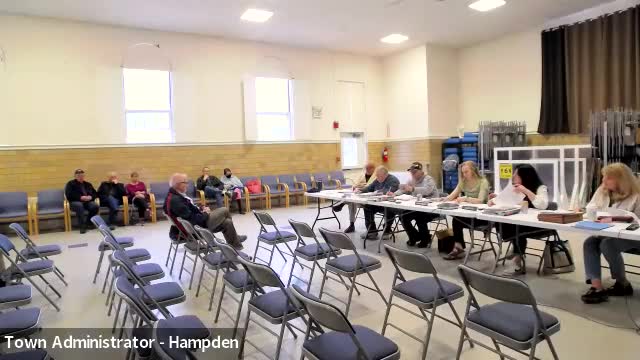Hampden planning board holds public hearing on draft battery energy storage zoning bylaw

Summary
The Hampden Planning Board opened a public hearing April 16 on a proposed zoning bylaw to regulate battery energy storage systems (BESS), hearing resident concerns about water, fire risk and siting and receiving written comments from town counsel urging factual support for any limits.
The Hampden Planning Board opened a public hearing April 16 on a proposed zoning bylaw to regulate battery energy storage systems (BESS), hearing resident concerns about water, fire risk and siting and receiving written comments from town counsel urging factual support for any limits.
The board is proposing a tiered approach that would allow small systems in residential settings and require special permits for larger, higher‑capacity systems. The draft sets technical requirements including a 30‑foot cleared zone around BESS enclosures, a 30‑foot vegetative buffer with specified planting heights and an operations and maintenance plan; the board voted to increase front setbacks to 75 feet and side/back setbacks to 100 feet in limited industrial areas and to add clearer maintenance and notice procedures before the bylaw is finalized.
Why it matters: the state has accelerated model language for BESS, and Massachusetts case law and the Dover Amendment (Mass. Gen. Laws c.40A §3) limit how far communities can restrict energy uses. Hampden officials said the town’s water resources and wetlands merit careful tailoring of any limits; town counsel’s preliminary review cautioned that a bylaw that effectively excludes BESS could be rejected by the Attorney General’s office or face litigation.
Key points from the hearing - Tiered permitting: The draft uses tiers tied to energy capacity. Tier 1 is for small, single‑system installations (capacity described in the draft as 250 kilowatts or less) and would be permitted in residential areas with review; higher tiers would require special permits and be confined to commercial or limited industrial districts. - Setbacks and buffers: Board members agreed to raise setbacks in limited industrial zones to match the district minimums (front 75 feet; side and rear 100 feet). The draft requires areas within 30 feet of a BESS enclosure to be cleared of combustible vegetation and separately prescribes a 30‑foot vegetative screening buffer (planting heights and spacing noted in the draft) to reduce visual impact. - Fire and safety: Residents and former fire officials warned that lithium‑ion battery fires can re‑ignite and said building and fire codes (including the National Electrical Code) and local fire department procedures will be relevant to site approvals. Board members said building and fire departments will need to review installations in addition to the zoning permit. - Legal review and evidence: A cover letter from town counsel will accompany the bylaw when the board forwards it; counsel advised that any municipal interest cited (for example, protections for water supplies) should be substantiated with documented statistics or technical evidence rather than broad assertions to withstand Attorney General review. - Operations and monitoring: The draft requires an operations and maintenance (O&M) plan be submitted with site applications that describes maintenance schedules, vegetation management for buffers and the cleared safety zone, and noise and monitoring measures; the board discussed specifying when noise testing must be conducted (day/night/24‑hour sampling) and to what standard.
Public comment and next steps Resident Donald Davenport thanked the board for the accelerated work but urged emphasizing water‑resource protections in the materials the board forwards to town meeting and the Attorney General. Other residents asked for clarity about how capacity tiers would apply on individual lots and whether large “tier 4” systems (described in the draft as greater than 10 megawatt‑hours aggregate capacity) would be appropriate near residences or sensitive natural areas.
The board closed the public hearing for Case 2025‑B with a formal motion and second and agreed to incorporate the changes discussed—including the revised setbacks, clarified O&M content and specific vegetation buffer language—and to reconvene on April 30 to review a revised draft before making a recommendation to town meeting and submitting materials to town counsel and the Attorney General for preliminary review.
The board and applicants repeatedly noted that Attorney General review may approve, return with suggested edits, or in part reject limitations that operate as effective prohibitions under the Dover Amendment; the board intends to attach a data‑driven cover letter supporting its municipal interests when it forwards the bylaw for review.

